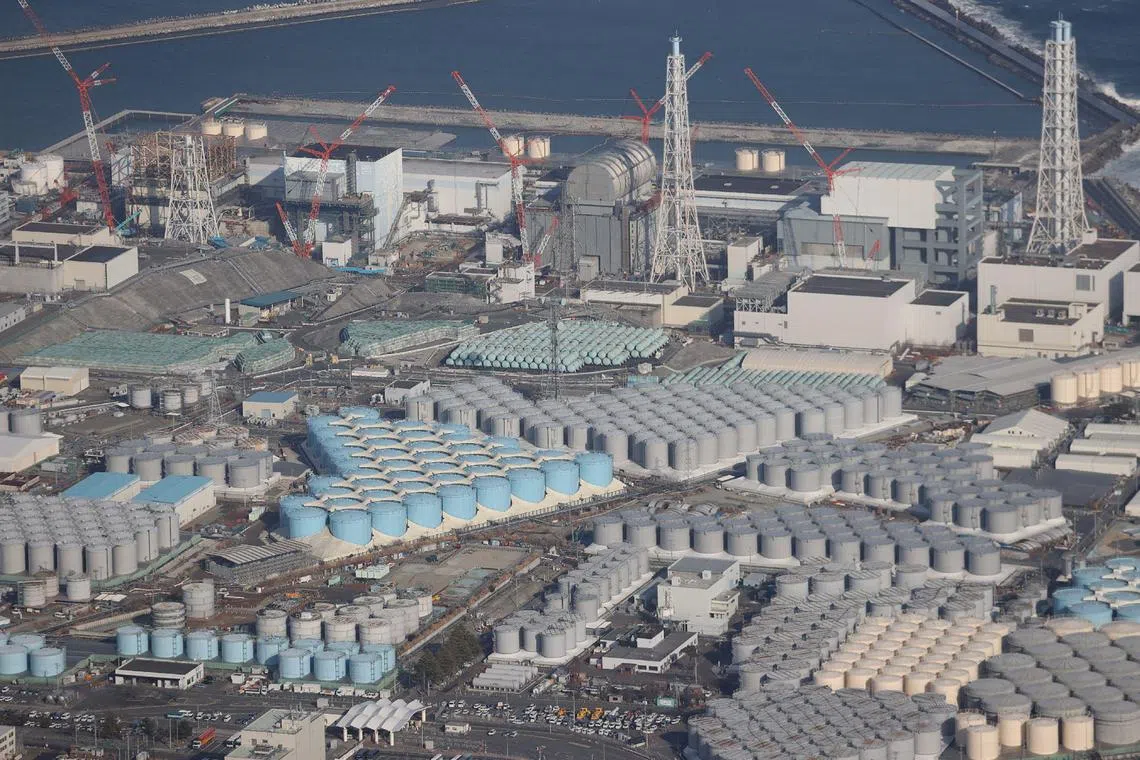Pacific islands urge Japan to delay Fukushima water release over contamination fears
Sign up now: Get insights on Asia's fast-moving developments

The ruling affirmed a non-guilty verdict in September 2019 for the ex-bosses from the Tokyo Electric Power Company (TEPCO).
PHOTO: AFP
Follow topic:
TOKYO - Pacific island nations are urging Japan to delay the release of water from the destroyed Fukushima nuclear power plant over fears that fisheries will be contaminated, the Pacific Island Forum (PIF) said on Wednesday.
The Japanese government said last week that water from the nuclear power plant could be released into the sea “around this spring or summer”, raising concerns from island nations still grappling with the legacy of nuclear testing decades ago.
Japan had approved the future release of more than one million tonnes of water from the site into the ocean after treatment in April 2021.
The PIF, a regional bloc of 17 island nations, argues that the release of the water could have a major impact on fishing grounds that island economies rely on, and where up to half of the world’s tuna is sourced.
“Our region is steadfast that there be no discharge until all parties verify it is safe,” PIF Secretary-General Henry Puna said on Wednesday at a live-streamed public meeting in Suva, Fiji.
“We must prevent action that will lead or mislead us towards another major nuclear contamination disaster at the hands of others,” he added, saying that Pacific islanders continued to endure the long-term impacts of the nuclear testing legacy on a daily basis.
The United States conducted nuclear testing in the Pacific islands in the 1940s and 1950s and the Marshall Islands continues to campaign for more compensation from Washington over lasting health and environmental effects.
France conducted atomic testing between 1966 and 1996 at Mururoa Atoll in French Pacific territories.
Dr Ken Buesseler, a scientist with the Woods Hole Oceanographic Institute, told the forum on Wednesday that a PIF scientific expert panel was urging Japan to reconsider the water release because it was not supported by data and more information was needed.
Radioactivity moves across the ocean with currents and tides and risks contaminating fish, he said.
Japan’s Foreign Ministry has previously said that regulators deemed it safe to release the water, which would be filtered to remove most isotopes but would still contain traces of tritium, an isotope of hydrogen hard to separate from water.
Meanwhile, Tokyo’s High Court on Wednesday upheld the acquittal of three former executives from the operator of the Fukushima nuclear plant, again clearing them of professional negligence over the 2011 disaster.
The decision was announced by activists supporting the prosecution of the three men, following the appeal hearing in the only criminal trial to arise from the world’s worst nuclear accident since the Chernobyl disaster in 1986.
The court declined to comment on the verdict while the session was ongoing.
A massive tsunami swamped the Fukushima Daiichi plant
The tsunami left 18,500 people dead or missing.
No one was recorded as having been directly killed by the nuclear accident, which forced evacuations and left parts of the surrounding area uninhabitable.
Wednesday’s ruling affirmed a non-guilty verdict in September 2019 for the former bosses of the Tokyo Electric Power Company.
The three men had faced up to five years in prison if convicted.
They were accused of liability for the deaths of more than 40 hospitalised patients who had to be evacuated following the nuclear disaster.
But the Tokyo District Court said in 2019 that they could not have predicted the scale of the tsunami that triggered the disaster, a decision that was upheld by the High Court.
The criminal case has been in the spotlight after a separate landmark verdict in July in a civil case involving the same three men and one other former executive.
The four were ordered to pay 13.32 trillion yen (about S$134 billion at today’s rates) for failing to prevent the disaster.
Lawyers have said the enormous compensation sum is believed to be the largest amount ever awarded in a civil lawsuit in Japan – although they admit that it is symbolic, as it is well beyond the defendants’ capacity to pay. REUTERS, AFP

